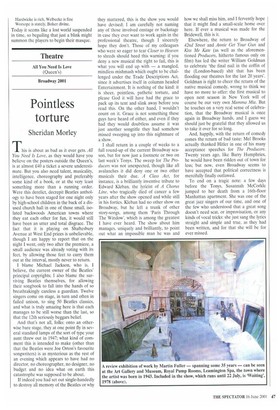All You Need Is Love (Queen's) Broadway 2001
Pointless torture
Sheridan Morley
This is about as bad as it ever gets. All You Need Is Love, as they would have you believe on the posters outside the Queen's, is at almost £40 a ticket a severe underestimate. But you also need talent, musicality, intelligence, choreography and preferably some kind of a book, or at the very least something more than a running order. Were this derelict, decrepit Beatles anthology to have been staged for one night only by high-school children in the back of a disused church hall in one of those small, isolated backwoods American towns where they eat each other for fun, it would still have been an utter and total disgrace. The fact that it is playing on Shaftesbury Avenue at West End prices is unbelievable, though I am happy to report that on the night I went, only two after the premiere, a small audience was already voting with its feet, by allowing those feet to carry them out at the interval, mostly never to return.
I blame Michael Jackson, who is, I believe, the current owner of the Beatles' principal copyrights; I also blame the surviving Beatles themselves, for allowing their songbook to fall into the hands of so breathtakingly careless a guardian. Twelve singers come on stage, in turn and often in failed unison, to sing 50 Beatles classics, and what is truly amazing here is that each manages to be still worse than the last, so that the 12th seriously beggars belief.
And that's not all, folks: onto an otherwise bare stage, they at one point fly in several standard lamps of the sort of type your aunt threw out in 1947; what kind of comment this is intended to make (other than that the Beatles were Joe Orton's favourite songwriters) is as mysterious as the rest of an evening which appears to have had no director, no choreographer, no designer, no budget and no idea what on earth this catastrophe was supposed to be about.
If indeed you had set out single-handedly to destroy all memory of the Beatles or why
they mattered, this is the show you would have devised; I am carefully not naming any of those involved onstage or backstage in case they ever want to work again in the professional theatre, though I sincerely hope they don't. Those of my colleagues who were so eager to tear Closer to Heaven to shreds should heed this warning: if you deny a new musical the right to fail, this is what you will end up with — a mangled, mindless mishmash which ought to be challenged under the Trade Descriptions Act, since it advertises itself in columns headed Entertainment, It is nothing of the kind: it is sheer, pointless, pathetic torture, and please God it will have had the grace to pack up its tent and slink away before you read this. On the other hand, I wouldn't count on it. Grace is not something these guys have heard of either, and even if they had they would doubtless assume it was just another songtitie they had somehow missed sweeping up into this nightmare of a show.
I shall return in a couple of weeks to a full round-up of the current Broadway season, but for now just a footnote or two on last week's Tonys. The sweep for The Producers was not unexpected, though like all avalanches it did deny one or two other musicals their due. A Class Act, for instance, is a brilliantly inventive tribute to Edward Kleban, the lyricist of A Chorus Line, who tragically died of cancer a few years after the show opened and while still in his forties. Kleban had no other show on Broadway, but he left a trunk of other story-songs, among them 'Paris Through The Window', which is among the greatest I have ever heard. The show about him manages, uniquely and brilliantly, to point out what an impossible man he was and
how we shall miss him, and I fervently hope that it might find a small-scale home over here. If ever a musical was made for the Bridewell, this is it.
Elsewhere, the return to Broadway of 42nd Street and Annie Get Your Gun and Kiss Me Kate (as well as the aforementioned Producers, hitherto famous only on film) has led the writer William Goldman to celebrate 'the final nail in the coffin of the (London-based) shit that has been flooding our theatres for the last 20 years'. Goldman is right to cheer the return of the native musical comedy, wrong to think we have no more to offer: the first musical to open next season in New York will of course be our very own Mamma Mia. But he touches on a very real sense of celebration, that the Broadway musical is once again in Broadway hands, and I guess we should just be grateful that they allowed us to take it over for so long.
And, happily, with the return of comedy comes the return of bad taste: Mel Brooks actually thanked Hitler in one of his many acceptance speeches for The Producers. Twenty years ago, like Barry Humphries, he would have been ridden out of town for less; but now, even Broadway seems to have accepted that political correctness is mercifully finally outlawed.
To end on a tragic note: a few days before the Tonys, Susannah McCorlde jumped to her death from a 16th-floor Manhattan apartment. She was one of the great jazz singers of our time, and one of the few who understood that a great song doesn't need scat, or improvisation, or any kinds of vocal tricks: she just sang the lyrics straight and simple and true, as they had been written, and for that she will be for ever missed.


































































 Previous page
Previous page